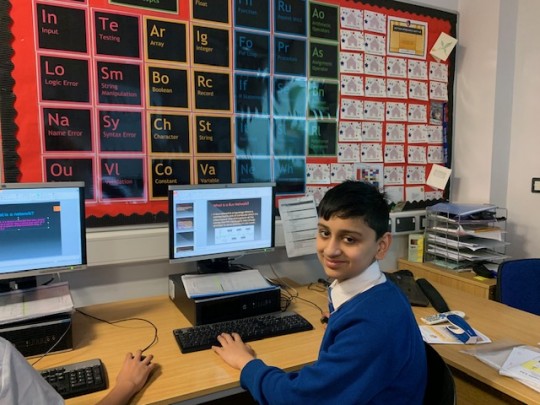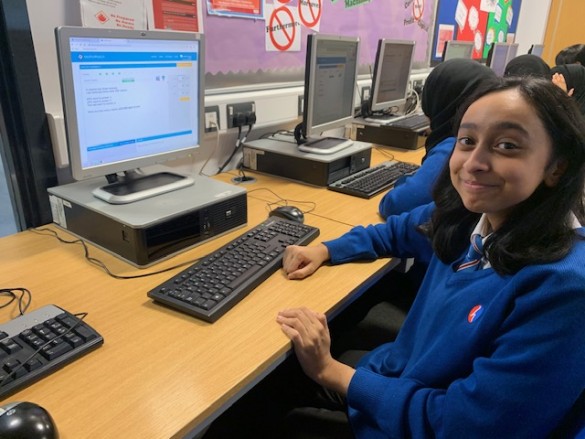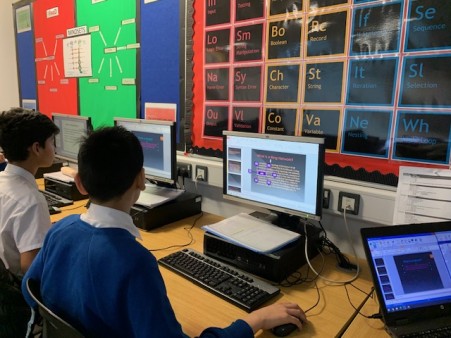Year 7 Computing
During Year 7 in Computing, students will cover the following topics:
- Digital Literacy
- Computer Systems
- Networks
- Small Basic Programming

Digital Literacy
In digital literacy students learn how to use computers effectively in the modern environment, including formatting skills in word processors, presentation and spreadsheet software. Students will complete a digital literacy project which combines all their skills learnt across the three areas.
Computer Systems
Students will discover the different components of Computer Systems and how these work together to create the modern personal computer we know today. Students will be able to recognise the various operating systems and utility software used in modern digital devices.
Networks
Students explore the different ways in which digital devices communicate and interact with each other.
They will learn about the main network topologies and assess the effectiveness of each in a given real world scenario. Additionally, students gain an insight into how the internet transfers data around the world via various methods.
Small Basic Programming
Students will have an introduction to the world of computer programming using Microsoft Small Basic. They will be introduced to key programming concepts such as sequencing, iteration and selection, which they will then use in creating their own interactive quiz program.
Year 8 Computing
In addition to the topics listed below, the year will begin with a number of lessons covering current e-safety issues to develop their existing understanding further. This will ensure students know how to operate digital devices in a safe and responsible manner.
- Digital Graphics
- Data Representation 1
- Computer Systems
- Computational Thinking
-
Python Programming

Digital Graphics
Students will explore the creative tools available to them in Photoshop, for example layering, blur, clone stamp, magic wand etc to create a professional magazine advert that will meet the needs of an intended target audience. Students will be expected to research and evaluate the needs of their target audience to ensure their cover is fit for purpose. Students will also assess the wider use of digital imagery and the impact these can have on the viewer.
.
Data Representation 1
Students will discover how computers store and represent different forms of data through the use of binary - the underpinning language of all digital devices. They will look at the binary number system, converting binary numbers to denary and hexadecimal and how to calculate binary addition and binary shift.
Computer Systems
Building on Year 7 Computer Systems, students are given the opportunity to revisit, recall and develop their knowledge of systems, how they are composed and work.
Students will study how logic gates are used to control the flow of data, how CPUs process data, different methods of storing data and the role of the Operating System.
Computational Thinking
Students develop their problem solving skills by making use of the principles that underpin programming in Computer Science - pattern recognition, sequence, decomposition and abstraction. This is further supported through the creation of flowcharts using the Flowgorithm and Flowol software packages.
Python Programming
Students will build on their programming and computational thinking skills by learning to write code in a professional language. They will learn a number of fundamental and transferable programming skills including - data types, mathematical operations, sequencing and selection.
Year 9 Computing
In addition to the topics listed below, the year will begin with a number of lessons covering current e-safety issues to develop their existing understanding further. This will ensure students know how to operate digital devices in a safe and responsible manner.
During Year 9 in Computer Science, students will cover the following topics:
- Advanced Python
- Societal Impacts: Cyber Security
- Societal Impacts: Online Data
- Careers
- Data Representation 2
- Sheets

Advanced Python
Building upon their previous learning from Year 8, students will continue to develop their programming skills including - iteration, arrays, subroutines and verification & validation routines.
Societal Impacts: Cyber Security
Students will learn about the threats online posed by Malware and Social Engineering techniques. They will look at key examples of each, discuss why malicious users make use of these techniques and how we can protect ourselves and our data online.
Societal Impacts: Online Data
Building on their learning from the Autumn Term, students look at how online data and activities form a digital footprint. They will look at how data is collected, and used by other parties. Students will study how organisations use big data from multiple sources to analyse and predict human behaviours.
Careers
Students will complete a cultural capital project to investigate the different career options related to Computing and look at the different routes to employment in the tech sector. Students will also look at what it is like to be an employee and will learn about the different option routes at KS4.
Data Representation 2
Students will discover how computers store and represent different forms of data through the use of binary - the underpinning language of all digital devices. They will look at the binary number system, text representation, image and sound representation. Finally, students will develop the skills to calculate the effects of these on file size vs file quality.
Sheets
This unit will help students to develop their understanding of how to use and manipulate spreadsheets, for a range of uses. This will include formatting, formulas, advanced functions and interactive use.

